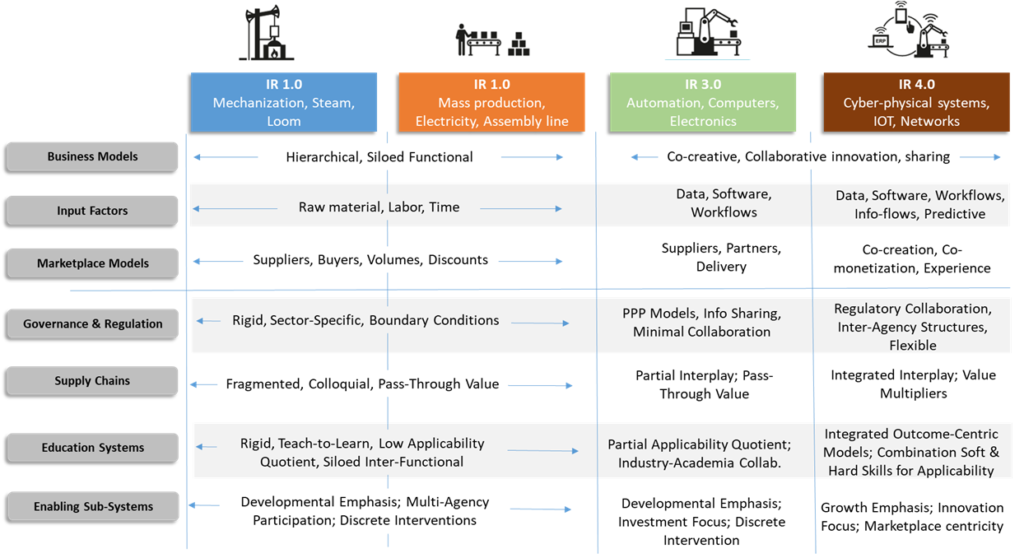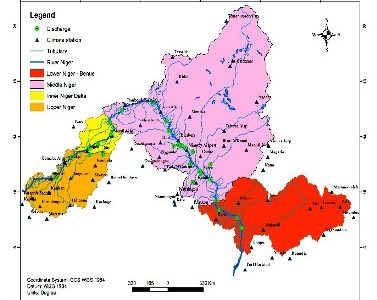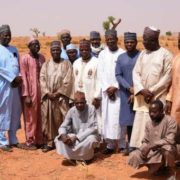By Bobby Varanasi
A Connected World
Over the past century, industrialization has been adopted globally through shifting production activities from homes to factories, and from incorporating mechanization (complimenting human labor) to enhancing productivity. Alongside, millions of jobs (and attendant skills) were created to work in a concerted manner to deliver the highest value attainable. Humanity added new skills to its repertoire, complimented by mechanization. Scientific progresses subsequently enabled enhancements to these two components, while a parallel track of globalization assisted in dispersing such competencies worldwide. Global factories, production spread-outs, and mass customization became the norm for well over five decades. As computing environments began to spread out from universities and defense entities, the foundations of a virtual world began to take shape. No one is a stranger anymore to the virtual environments existent today.
“Regulation has always worked in silos, with the fundamental premise that regulators and governments are the “policemen” enforcing good behavior. An array of regulations, and enhancements over time with changing business and economic circumstances has resulted in a quagmire, where the policing has gone from managing organized chaos toward unbridled enforcement.”
Over the past decade, convergence of physical and cyber worlds began to unleash itself on humanity, most tellingly in the services sectors. A range of innovations and intelligent technologies have come to play, broadly supported by the ubiquitous world-wide-web, and cheaper access point devices (particularly smartphones). Sectors that saw significant transformation have leveraged not just software and computing technologies, but other intelligent systems – technologically advanced machines that perceive and respond to the world around them. These systems are beginning to be deployed in a range of industries – manufacturing, medical research, bioengineering, industrial production, resource exploration, customer experience et al. The world of services too has begun to shift dramatically from traditional models to highly evolved, and intuitive ones where mass customization is being discarded, to be replaced by deep customization.
The first two industrial revolutions enabled humans to work together in a manner where the machines remained subjugated to human endeavor. Value derived was limited to enabling mass production. The third revolution began to discretely unleash the power of intelligence, although deployed marginally in very strategic sectors. Value derived was principally discovery of hitherto unknowable “data” that could be monetized, thereby creating new revenue streams, while further enabling customer experience.
The dawn of the fourth revolution is being viewed as an era where man and machine shall be able to co-exist, collaborate and mutually enhance all ecosystems – production, consumption, distribution. The exponential value expected to be derived from such effort is positioned as a combination of the known (where significant productivity-related baggage could be eliminated, efficiencies gained at lower costs per unit of production and distribution), and the new (knowledge sharing, collaboration, convergence among sectors, flexibility and innovation).
Is the developing world ready to embrace IR 4.0 in a concerted manner? The obvious answer is yes. However, the extent of change required to be able to remain on the path toward establishing a connected and digitally savvy economy is fraught with complexities. This paper examines these elements and suggests that any effort at transforming economies would need not just adoption of technologies, but a fundamental overhaul of entire ecosystems (and sub-systems within).
The IR 4.0 Landscape
The following graphic represents the state of IR globally. We mapped various ecosystem elements, and emphasize its implications on the developing world (without hinting at any specific nation) so as to remain generic in our observations at this point.
The primary premise is to understand how the four IRs layer on top of each other. It would be a misnomer to state that the new has completely replaced the old, given that certain elements contributing to progress are slower than others, as illustrated in graphic below.


We firmly believe that any nation’s endeavor in the economic and social realm is subject to a variety of elements working in tandem, and seamlessly imbibing change aligned with consumption and marketplace patterns, while remaining true to their cultures, traditions and aspirations. For all the excitement surrounding IR 4.0, many nations continue to emphasize it without looking at the intricacies of these elements, interacting in a veritably complex manner to create and sustain value. Readiness is often seen as a function of roadmaps, and instructions to sectors to overhaul themselves into the future. It is easier said than done. The interplay of the various elements elucidated in the infographic above is quite crucial to appreciate.
Business Models: Traditional ones are being fast replaced by modern, collaborative ones where emphasis on ownership and control is giving way to co-creation, sharing (of IP, value and risk) for sustained growth and effectiveness. Businesses would find it difficult to retrofit their traditional models and embark on a transformation journey. A complete overhaul is necessary.
“Education Systems [is]the single biggest detriment to progress manifests in human competence within a nation/ ecosystem. Today’s education models are outmoded, outdated and substantially ineffective in creating an employable workforce. Fast-paced changes in industries seek modern skills unconstrained by history, yet complimented by agility, and an ability to impart “learn-unlearn-relearn” competencies by its constituents. Industrial shifts will not wait for skills to be ready.”
Input Factors: From standard raw material and labor, to quality and JIT production, to assembly lines and mass customization, we have glorified the nature of inputs, and paid handsomely for the sophistication of such inputs. Today’s businesses continue to pay for inputs, while outcomes are almost always a slave to the nature of such inputs. Shifting focus to outcomes is not just about adopting modern technologies. Instead, it is about a concerted and integrated endeavor at backcasting from outcomes to identifying the necessary inputs. Such an overhaul is not only necessary, but pivotal for entities and nations to move into an integrated and connected world.
Marketplace Models: Perhaps the most poignant of shifts has been evidenced in the changing nature of consumption patterns, delivery models, product-service convergence, value shifting and erosions, and monetization opportunities. Data is the new oil, they say. We believe it is much more than just mining and monetizing data. It is about influencing, convincing and enabling consumption that in turn impacts production models in larger ways than envisaged before. Collaboration amongst producers that was previously anathema is beginning to create flourishing opportunities, for the large and small entities alike. However, for an ecosystem to enable such a shift has to ensure endeavor is not just aimed at end-consumers. Instead, entire value chains need to overhaul themselves toward an outcome and experience-centric future.
Governance & Regulation: Regulation has always worked in silos, with the fundamental premise that regulators and governments are the “policemen” enforcing good behavior. An array of regulations, and enhancements over time with changing business and economic circumstances has resulted in a quagmire, where the policing has gone from managing organized chaos toward unbridled enforcement. Inter-regulatory collaboration is of utmost need to ensure that convergence in an IR 4.0 is effectively managed without value dilution. Gone are the days when regulators could afford to remain skeptical of changing business models, and withdraw themselves into conservative positions. Gone are the days when regulators could draw clear and unequivocal boundaries to their influence (relating to sectors). It is highly imperative that regulators (and consequent legal strictures) collaborate in a manner befitting industrial convergence, such that their oversight remains relevant and unambiguous. This is perhaps the single biggest challenge for most developing nations.
Supply Chains: Substantially fragmented supply chains within developing nations, and around the world may have created a veritably complex environment where value hand-offs work in tandem with demand-supply dynamics. The supply chains of the future would have to necessarily move toward integrating themselves into the final outcomes and enable value multipliers. Integrated interplay amongst players would need to take precedence over balance sheets or contractual obligations. Any forward-looking entity working with a network of providers cannot afford to have its ecosystem be a slave to ill-equipped components. An evolved yet integrated approach has to give way to traditional models. This can only happen when such an ecosystem works together toward specific outcomes. Nations too will need to overhaul such supply chains in a concerted manner to compliment economic endeavors. Else the IR 4.0 model would collapse before it begins.
Education Systems: The single biggest detriment to progress manifests in human competence within a nation/ ecosystem. Today’s education models are outmoded, outdated and substantially ineffective in creating an employable workforce. Fast-paced changes in industries seek modern skills unconstrained by history, yet complimented by agility, and an ability to impart “learn-unlearn-relearn” competencies by its constituents. Industrial shifts will not wait for skills to be ready. On the contrary, skill development will have to collaborate with industry and build competencies alongside. Further, traditional content packaged in the form of “information for knowledge” has to be replaced by delivery models where content is focused on creating “applicable value”. To this end, formal education systems languishing with models where subject-specific inputs are provided in increasing order of complexity need to be immediately replaced by outcome-specific content. Fungibility of content is key. Applicability of such knowledge is crucial. Content delivery aimed at solving problems is critical. Only then can a biological workforce continue to work in tandem with a non-biological workforce to create value. The ongoing debate around machines taking over humans may not necessarily have manifested significantly. Yet, it is imperative that human endeavor remains at the forefront of development. Skilling and reskilling are significant challenges. It would be wise for nations to overhaul their education systems, and not just lace traditional models with a few contemporary emphasis areas like robotics, or AI.
Enabler Subsystems: Most developing nations continue to grow on the back of their globalized and regionalized endeavors at collaborating with other nations – for investments, markets, customers and partners. However, internal enabler entities, particularly parastatal agencies and wealth funds would need to proactively look at working in tandem with each other. For e.g. convergence has necessitated that banking and telecom regulators combine their endeavors at forming rules, or creating opportunities. In the absence of such collaboration, national footprints would continue to remain subjugated to obsolete models that industry may almost always reject. Inter-agency collaboration is of utmost necessity in a networked world order to ensure smooth information flows, and value creation. Economic and commercial enablement has to dovetail alongside each other seamlessly. Alternatively, a certain small component of an industry may push the boundaries of value creation, while all other components languish. It is clear that in such cases the whole will be much lesser than the sum of its parts – a highly undesirable situation to be in.
Conclusion
We believe that developing nations have a long and arduous task ahead. Positing strategies for the future may well reflect their commitment to growth and competitiveness. However, it is important to accept that the new cannot be layered on top of the old, and expect miracles to happen with economic transformation. IR 4.0 presents a plethora of opportunities. Yet, its very nature requires that one deals with the inherent complexities, instead of either diluting toward simplicity, or worse, fixing discrete elements and hoping for miracles to happen. Fundamental shift across the entire ecosystem (as elucidated above) are critical, else it may be good effort wasted over bad ideas.


Bobby Varanasi is one of the acknowledged Top 25 Globalization Leaders in the global sourcing space and the Founder of Matryzel Consulting – an independent advisory firm that has been acknowledged as one of the World’s Best Outsourcing Advisory Firmsthree years in a row (2013, 2014 and 2015). He brings with him two decades years of experience in consulting and management across IT, Business Services and building global operations. He advises federal governments across four continents on ICT sector development with particular emphasis on policy development, industry-government partnerships aimed at creating domestic resilience through increasing productive (and inclusive) faculties of entrepreneurs. Bobby also advises Fortune 500 customer organizations and emerging market entrepreneurs on strategy, growth, sourcing and expansions. He is often quoted and published in Forbes, fDi, Economist, The Outsourcing, ICT Media BV, Ratio Magazine Africa, etc.
Bobby holds Board positions with the International Association of Outsourcing Professionals (IAOP) – a global standard setting organization for the sourcing industry; the Global Sourcing Council (GSC) – an entity focused on sustainable and socially responsible sourcing practices (both headquartered in New York); and the Malaysia Australia Business Council (MABC) – an entity focused on cross-border trade enablement. He is an Assessor & Mentor, Product Development & Commercialization Fund (PCF), established and managed by Malaysia Digital Economy Corporation, Govt. of Malaysia that focuses on new technologies, new trends and entrepreneurship development.
He is author of a book titled “Humanomics – Making Sense of Socio-economic Impacts of Global Sourcing”published by Author House (a Penguin Random House company), which is available on Amazon, Google Books etc. An avid scuba diver and basketball player, he currently splits his time between Newark, DE, USA and Kuala Lumpur, Malaysia with his wife and two sons.































